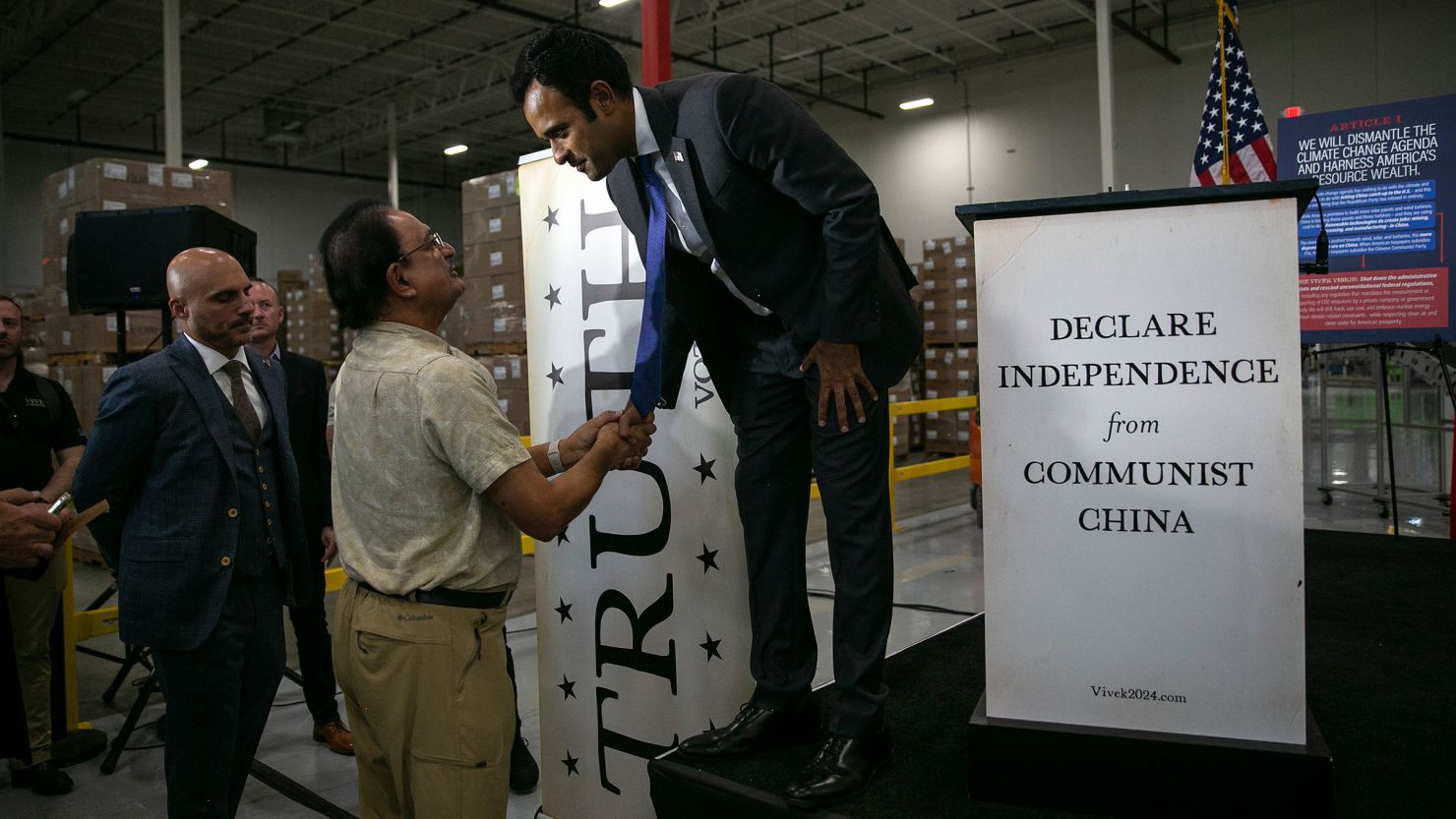Less than three months ago, Republican presidential hopeful Vivek Ramaswamy was gaining traction in the polls, backed by a populist outsider message and an attention-grabbing performance at the first primary debate. Today, the Ohio entrepreneur is still stuck in the single digits in a thinning GOP primary pack.
Former President Donald Trump – whom Ramaswamy has defended and praised repeatedly – remains the front-runner for the GOP nomination. Florida Gov. Ron DeSantis and former South Carolina Gov. Nikki Haley are competing to be seen as the main Trump alternative in a field that has grown smaller with the recent exits of former Vice President Mike Pence and South Carolina Sen. Tim Scott.
At the most recent Republican debate in Miami, Ramaswamy bet that attacking Republican National Committee chairwoman Ronna McDaniel, interrogating moderator Kristen Welker instead of answering the question posed to him and trying to ding Haley over her daughter’s use of TikTok would shift the national political spotlight on to him. It didn’t. A 538/Washington Post/Ipsos poll of potential GOP primary voters who watched the debate found his unfavorability rating rising 12 points to 47%.
Ramaswamy and his team have recently moved to redistribute staff and resources. The campaign relocated most of the staff from Columbus, Ohio, to New Hampshire and Iowa – a move campaigns often make as a strategic Hail Mary to build momentum around a strong performance in an early nominating state. The staffing shift came days after the campaign announced an approximately $10 million ad buy in Iowa and New Hampshire, its first major one of the cycle.
The Ramaswamy campaign believes these moves, coupled with his confrontational rhetoric at the Miami debate, will translate to improvements in the polls – but not right away.
“At this third debate, he definitely came out swinging, which I think everyone saw, and I think that’s kind of the tone he’s going to continue for the rest of the campaign,” campaign senior adviser Tricia McLaughlin said. “We’ve been purely reliant on earned media and on-the-ground events. We’re going to shift tactics in New Hampshire and Iowa. We’re optimistic that between a strong debate performance and earned media, that he’s going to start seeing some bumps. I don’t think we’re going to see the difference until January.”
McLaughlin pointed to internal campaign data that suggests polls of likely Republican primary voters may be underestimating Ramaswamy’s appeal. In the previous fundraising quarter, 38% of contributions came from donors who had never contributed to a Republican candidate before Ramaswamy, McLaughlin said.
Most telling to observers, though, has been Ramaswamy’s inability to retain the outsider message he used to break into national politics. Initially, the Ohio businessman framed his campaign as an “America First” outsider operation focused on recognizing the common man à la Trump. Ramaswamy and his team set aside time he could have spent in the early GOP nominating states to instead embark on a “Michigan Unforgotten American Tour” through the Wolverine State with stops in Flint, Saginaw and Big Rapids.
An Ivy League graduate, Ramaswamy, however, also has a tendency to engage in discussions that veer further into the academic and away from the red-meat appeals that conservative base supporters love. Regularly, Ramaswamy talks about foreign policy priorities such as strengthening “space-based” military capabilities and super-EMP weapons. He often goes deep on bolstering US trade relationships with countries such as India, Japan and Chile as a way to counter China’s influence on the American economy. On Thursday, Ramaswamy is rolling out his policy on cryptocurrencies at the North American Blockchain Summit in Texas.
Michael Duncan, a Republican strategist and co-host of the “Ruthless” podcast, said Ramaswamy has veered too far into “ShamWow conservatism” in which a candidate tries to one-up his competitors on anything from speeches and intensity to policy proposals.
“It’s sad to see a candidate so smart and talented debase himself with trite sloganeering,” Duncan said. “I think it’s a symptom of following what’s on Twitter all the time. If you’re into cryptocurrencies and trading NFTs, you probably are really into what Vivek is having to say. But I think there’s an upper limit to that audience. They may be very loud online but they do not represent anything close to a majority of the Republican electorate.”
On Wednesday, the campaign doubled down on attacking McDaniel, launching a petition that called on the chairwoman to resign from the RNC. Ramaswamy’s argument is that McDaniel has presided over the committee during multiple campaign cycles that have seen Republican candidates fare poorly or underperform expectations.
“We’ve become a party of losers at the end of the day,” Ramaswamy said during the Miami debate. “I mean, since Ronna McDaniel took over as chairwoman of the RNC in 2017, we have lost 2018, 2020, 2022 — no red wave that never came. We got trounced last night in 2023. And I think that we have to have accountability in our party.”
Ramaswamy’s attacks on McDaniel and the RNC speak to a broader messaging strategy that prioritizes breadth and volume over a more tailored approach to campaigning. He’s spent extended portions of multiple public appearances articulating his views on the ongoing conflict between Azerbaijan and Armenia. As part of his proposal to address abortion, he’s repeatedly called for “sexual responsibility for men” to be “codified into law,” a policy he says would place a greater financial burden on fathers confirmed via paternity tests. On Veterans Day, he announced a plan to authorize veterans suffering from PTSD symptoms to use psychedelic drugs as part of their treatment.
Ramaswamy also spent time in New Hampshire in a one-on-one debate with Democratic Rep. Ro Khanna of California, a move that offers little strategic upside during the Republican primary.
There’s been little evidence that any of that has done him any favors. Where Haley has steadily gained in the polls amid a series of strong debate performances, the Ohio entrepreneur’s position has remained stubbornly static.
For his part, Ramaswamy says his feuds and tangents allow him to present at his most comfortable self, which he believes will pay dividends with voters.
”I’m unrestrained in speaking what needs to be spoken that the other people are not saying about the Republican Party, about the Democrat Party, about the media. And my bet is that that’s going to be the winning political strategy,” he told CNN’s Dana Bash following the debate last week. “So, we’ll go with the truth of where I’m at my best, which is being unvarnished, being unshackled, speaking the truth, not just when it’s easy, but when it’s hard. And I think that our bet is that will be the successful approach.”
One thing Ramaswamy is sticking to is running a unique campaign. After the third debate, he cut out time to go wakeboarding in Miami with social media influencer Kaz Sawyer. The two promised to do something “even crazier” before the next debate if the video of their wakeboarding excursion went viral.






